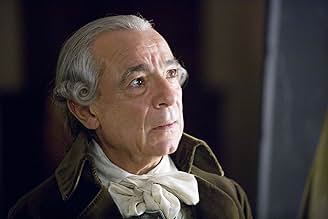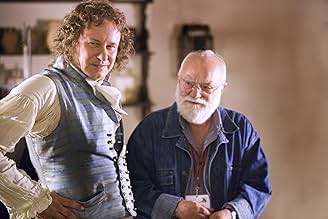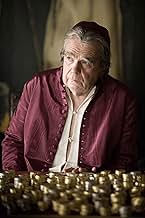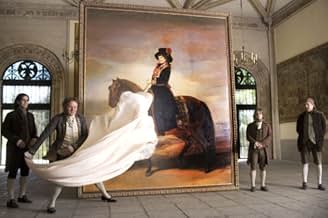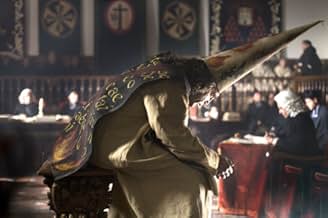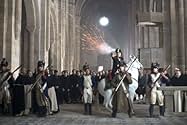VALUTAZIONE IMDb
6,9/10
32.674
LA TUA VALUTAZIONE
Il pittore Francisco Goya affronta uno scandalo che coinvolge la sua musa ispiratrice, che viene etichettata come eretica da un monaco.Il pittore Francisco Goya affronta uno scandalo che coinvolge la sua musa ispiratrice, che viene etichettata come eretica da un monaco.Il pittore Francisco Goya affronta uno scandalo che coinvolge la sua musa ispiratrice, che viene etichettata come eretica da un monaco.
- Regia
- Sceneggiatura
- Star
- Premi
- 2 vittorie e 5 candidature totali
Recensioni in evidenza
The acting and production values are of the highest order in "Goya's Ghost". Because I don't get around much anymore, I had not seen Ms Portman in a movie until "Ghost", and was very impressed, for like all the roles in this movie, her's was challenging. Javier Bardem is tough to equal in any movie, and as the 'heavy', (another heavy?!) he is outstanding; Stellan Skarsgård has come a long, long ways since "The Ox", and he has had a mixture of roles, some of them pretty thankless. As Goya, he does very well--a great actor. Natalie Portman--as I was a first timer regards seeing her work, I was bowled over--her role requires a terrible transformation, and makeup only goes so far, acting must be the key ingredient. So, along with the outstanding set designs and production values, Forman created another outstanding period piece. By the way, the actress Blanca Portillo who does the Spanish queen has a key small part--and you'll know her best scene when you see it! The story? It is about a wretched time and wretched people in a position of trust who violate that and prey on whomever they can. I think "Ghost" might not be for those who are not really into period pieces, but I am!
I read someone else's comment on IMDb (much more adulatory than I would be for Goya's Ghosts), who said that it was a masterpiece not only for Milos Forman and co-writer Jean-Claude Carriere, but for Luis Bunuel too. And that intrigued me even more than I was already in anticipation for the film, merely before as a Forman fan. Upon seeing it I can understand the enthusiasm, and had a kind of private, nearly perverse pleasure in recognizing (maybe too obviously on a subjective level) little things that popped up when Carriere and Bunuel collaborated on some of the late master's best works. On the other hand, for those not too familiar with films like the Phantom of Liberty, the Milky Way or That Obscure Object of Desire, Goya's Ghosts may seem like strong, strange film-making that starts to go a little more haywire after the half-way title card "15 Years Later" (possibly another in-joke for Un Chien Andalou fans) pops up. But it's not only certain things regarding the line between true drama and surrealism that marks Forman's latest as something interesting.
Matter of fact, it is a flawed film, notably in the casting of Stellan Skarsgaard as Goya himself. Why cast a Swedish actor, who usually isn't necessarily bad in the character-actor parts he takes on, in the role of one of the most decadent and ribald *Spanish* artists in the past 250 years of worldwide painting? Skarsgaard doesn't do too much to elevate the part outside of being the guy on the sidelines, dramatically trying to not get too much into the situations, at first, but then soon becoming like a match-maker in the second half when "daughter" drama happens between an ex-"Brother" and an ex-prisoner-of-inquisition. And yet, there is perfect casting in having Barden as the Brother Lorenzo, who doesn't change in how he tries to push aside any of the problems in his life that he doesn't want to deal with, be it questions of real faith, taking care of a certain lost woman, and his illegitimate child, even as he changes from man of the cloth to revolutionary in several years time. Seeing him in the first half in that black robe, his eyes dark and leering of Goya and even the Church to an extent, it's not wonder that he's one of the most sought-out actors of his time. And even better then that, as far as conventions go, he gets the truest kind of arc with his character.
Then there's Natalie Portman who, as probably as something of both an in-joke/reversal of the tactic used in 'Obscure Object' with two actresses playing the same woman, and a sort of disintegration-of-soul aspect that Forman might be after ambivalently, embodies the crushed innocence of repressive religion. Ines is tossed into a prison following a confession- whether true or not is left nicely vague- that she's Jewish following a questioning of what she ate, and left for more than a decade. Seeing her in this section it's clear she's lucid in her presentation of a simple characterization: sweet and naive, then later torn into oblivion by insanity and a near absurd desperation to find the child she birthed while in prison. When she plays the daughter it's a little more flat and pat, as all we see of her is as a 14 year-old (yes, 14 year-old) harlot. This mixed-up matching of actors (plus a few bits with Randy Quaid as a well-played pudgy king) is set to a backdrop of Spain where society is merciless and without much compromise unless the regime changes, which is towards one way (the ultra strict Catholics) or the other (the flawed Napoleon revolution people). Meanwhile, Goya, deaf, sketches away in drawings that today seem right out of graphic novels.
As mentioned, one may get some moments of random surprise as opposed to fully stark costume drama; the first appearance of Portman's daughter played by herself is a little doozy; the way the cardinal tells his choir boy to keep reading the passage even as the French soldier on horseback rides in with a decree, then shoots the boy midway through; the emergence of the British army going towards and swarming around a cart of 15 prostitutes left out in a field; the very last scene, where a cart carrying a dead man is followed by...say no more. So there is a drawback, or more than one at any rate, to Forman going for telling about the nature of the society around Goya than too much about Goya himself. It is a disappointment too to not get entirely, aside from the 'her face haunts me from that painting' logic, as to why Goya is so infatuated with Ines and her plight in the first place. There's not much to be seen into the man who drew such scandalous drawings whilst being the king's painter. What we get instead, which is intriguing and involving, if not totally successful, a story of corruption from the 'Powers-That-Be', and when it strikes at this Forman and Carriere get some good, juicy entertainment.
Matter of fact, it is a flawed film, notably in the casting of Stellan Skarsgaard as Goya himself. Why cast a Swedish actor, who usually isn't necessarily bad in the character-actor parts he takes on, in the role of one of the most decadent and ribald *Spanish* artists in the past 250 years of worldwide painting? Skarsgaard doesn't do too much to elevate the part outside of being the guy on the sidelines, dramatically trying to not get too much into the situations, at first, but then soon becoming like a match-maker in the second half when "daughter" drama happens between an ex-"Brother" and an ex-prisoner-of-inquisition. And yet, there is perfect casting in having Barden as the Brother Lorenzo, who doesn't change in how he tries to push aside any of the problems in his life that he doesn't want to deal with, be it questions of real faith, taking care of a certain lost woman, and his illegitimate child, even as he changes from man of the cloth to revolutionary in several years time. Seeing him in the first half in that black robe, his eyes dark and leering of Goya and even the Church to an extent, it's not wonder that he's one of the most sought-out actors of his time. And even better then that, as far as conventions go, he gets the truest kind of arc with his character.
Then there's Natalie Portman who, as probably as something of both an in-joke/reversal of the tactic used in 'Obscure Object' with two actresses playing the same woman, and a sort of disintegration-of-soul aspect that Forman might be after ambivalently, embodies the crushed innocence of repressive religion. Ines is tossed into a prison following a confession- whether true or not is left nicely vague- that she's Jewish following a questioning of what she ate, and left for more than a decade. Seeing her in this section it's clear she's lucid in her presentation of a simple characterization: sweet and naive, then later torn into oblivion by insanity and a near absurd desperation to find the child she birthed while in prison. When she plays the daughter it's a little more flat and pat, as all we see of her is as a 14 year-old (yes, 14 year-old) harlot. This mixed-up matching of actors (plus a few bits with Randy Quaid as a well-played pudgy king) is set to a backdrop of Spain where society is merciless and without much compromise unless the regime changes, which is towards one way (the ultra strict Catholics) or the other (the flawed Napoleon revolution people). Meanwhile, Goya, deaf, sketches away in drawings that today seem right out of graphic novels.
As mentioned, one may get some moments of random surprise as opposed to fully stark costume drama; the first appearance of Portman's daughter played by herself is a little doozy; the way the cardinal tells his choir boy to keep reading the passage even as the French soldier on horseback rides in with a decree, then shoots the boy midway through; the emergence of the British army going towards and swarming around a cart of 15 prostitutes left out in a field; the very last scene, where a cart carrying a dead man is followed by...say no more. So there is a drawback, or more than one at any rate, to Forman going for telling about the nature of the society around Goya than too much about Goya himself. It is a disappointment too to not get entirely, aside from the 'her face haunts me from that painting' logic, as to why Goya is so infatuated with Ines and her plight in the first place. There's not much to be seen into the man who drew such scandalous drawings whilst being the king's painter. What we get instead, which is intriguing and involving, if not totally successful, a story of corruption from the 'Powers-That-Be', and when it strikes at this Forman and Carriere get some good, juicy entertainment.
There is one great flaw here that almost everyone mentions... and it's true. The accents of the non-Spanish actors clash terribly with the Spanish ones, as well as with each other. That's a real flaw, but if you can get past that, there's a great film waiting to be seen. I found I forgot all about it after the first 10 minutes. The critics just don't get this film. A lot of regular people seem to miss it too. They want a film with a typical "leading" role. They want their morality tales (which this certainly IS) delivered in easy shades of Black and White... no gray. They don't understand films where the title character is primarily an Observer. Sometimes that CAN be dissatisfying, but here the Observer is a genuine genius. Some people want him to be a moral giant, but he's not, he's simply an observer who has actualized the doctor's oath: First, do no harm. This is a brilliant story, and a morally complex one, too. There are some parallels to America in Iraq, though that is not the primary goal. This story illuminates the folly of any regime, liberal or conservative, as each picks its friends and foes, taking 180 degree turns from whoever was last in power. Javier Bardem gives an incredibly canny performance! Natalie Portman is totally unsentimental and totally committed to her multiple roles: just great! Stellan Skarsgard threw me off at first with the sound of his voice, but builds a performance of power and truth, in spite of it. Randy Quaid was a small revelation. And of course the film looks and sounds spectacular, with it's numerous and detailed textures, compositions and sounds. If you want to think; if you like having pat assumptions challenged; if you love people and history and art: see it!
The film is set in 1792 ,it deals with eclectic people during a convulsed era from Spain history . It starts with the Inquisition and some years later with the encroachment by Napoleon Army and finishes with the French defeat and restoration of the Spanish monarchy with Fernando VII , after the victory by general Wellington (Cayetano M. Irujo) . The painter (1746, born Fuentedetodos and deceased 1828,Burdeos) Francisco de Goya (Stellan Skarsgard) , quintessential Spanish artist , becomes involved with the Spanish Inquisition , when his muse named Ines (director cast Natalie Portman after noticing her likeness to the girl in Goya's painting "Milkmaid of Bordeaux") who painted her like an Angel in the church of Saint Antonio of Florida and he's now portraying , she then is framed as a heretic . His daddy named Thomas Bilbatua (Jose Luis Gomez) ask him help , hoping what his relationship with the monk Lorenzo (Javier Bardem) can achieve the freedom for his daughter . Meanwhile , Goya is dedicated the painting of the portrait the royal family : Carlos IV (Forman cast Randy Quaid as the King of Spain after seeing his work in ¨Elvis¨ by phoning him and saying, "You are a great actor , you must be my King or I must repaint Goya") , Mª Luisa (Blanca Portillo) and children .
The film is a touching drama added with historic elements and formidable performances . The movie creates a canvas upon a turbulent epoch concerning specially with Inquisition . It was created by Pope Sixto IV in 1478 , its creation is supposedly caused for threat by Jewish and Moors becoming Christianism but practically disappeared with the Borbons Kings (Felipe V,Fernando VI and Carlos III) and was definitively abolished by the Court of Cadiz though spontaneously restored by Fernando VII in 1814 . The sentences were executed by means of a public event called ¨auto of faith¨(thus happens on the final) . Near the end, when the king appears in the balcony at the execution scene, some people yell "Vivan Las Cadenas!" (Long live the chains!). This salute was coined in 1814 by Spanish monarchists when Fernando VII was restored to the throne with absolute powers, thus abolishing the Constitution of Cadiz, which was established by Napoleonic authorities.
The flick displays an interesting showing the means are manufactured the famous Goya's engravings : ¨The war disasters¨ , ¨bullfighting¨ and ¨Caprichos¨ . Besides , recreating historical happenings such as ¨Charge of Mamelucos¨ and ¨Execution on mountain of Principe Pio¨. The movie contains a top-notch star-studded cast , as Skarsgard , Portman , Bardem give a sensational interpretations . Scenarios are luxurious and impressive , being designed by the prestigious Patrizia Von Brandenstein , the sets including palaces , rooms , interiors and outdoors are mesmerizing . Lush and brilliant costume design by Ivonne Blake (Oscar for Doctor Zhivago and Nicholas and Alexandra). Colorful cinematography by expert Spanish cameraman , Javier Aguirresarobe , (The others) . The film was lavishly produced by the brothers Saul and Paul Saentz , Forman's usual producers .The motion picture was well directed by the classic Milos Forman , an expert about biographies of notorious characters such as ¨Amadeus¨ , ¨Larry Flynt¨ , ¨Andy Kauffman¨ (Man on the moon) ; besides filming a lot of successes like are ¨Ragtime¨ ,¨Hair¨, ¨Valmont¨ , and of course , his greatest hit ¨Someone flow the Cucko nest¨.
The film is a touching drama added with historic elements and formidable performances . The movie creates a canvas upon a turbulent epoch concerning specially with Inquisition . It was created by Pope Sixto IV in 1478 , its creation is supposedly caused for threat by Jewish and Moors becoming Christianism but practically disappeared with the Borbons Kings (Felipe V,Fernando VI and Carlos III) and was definitively abolished by the Court of Cadiz though spontaneously restored by Fernando VII in 1814 . The sentences were executed by means of a public event called ¨auto of faith¨(thus happens on the final) . Near the end, when the king appears in the balcony at the execution scene, some people yell "Vivan Las Cadenas!" (Long live the chains!). This salute was coined in 1814 by Spanish monarchists when Fernando VII was restored to the throne with absolute powers, thus abolishing the Constitution of Cadiz, which was established by Napoleonic authorities.
The flick displays an interesting showing the means are manufactured the famous Goya's engravings : ¨The war disasters¨ , ¨bullfighting¨ and ¨Caprichos¨ . Besides , recreating historical happenings such as ¨Charge of Mamelucos¨ and ¨Execution on mountain of Principe Pio¨. The movie contains a top-notch star-studded cast , as Skarsgard , Portman , Bardem give a sensational interpretations . Scenarios are luxurious and impressive , being designed by the prestigious Patrizia Von Brandenstein , the sets including palaces , rooms , interiors and outdoors are mesmerizing . Lush and brilliant costume design by Ivonne Blake (Oscar for Doctor Zhivago and Nicholas and Alexandra). Colorful cinematography by expert Spanish cameraman , Javier Aguirresarobe , (The others) . The film was lavishly produced by the brothers Saul and Paul Saentz , Forman's usual producers .The motion picture was well directed by the classic Milos Forman , an expert about biographies of notorious characters such as ¨Amadeus¨ , ¨Larry Flynt¨ , ¨Andy Kauffman¨ (Man on the moon) ; besides filming a lot of successes like are ¨Ragtime¨ ,¨Hair¨, ¨Valmont¨ , and of course , his greatest hit ¨Someone flow the Cucko nest¨.
I think Goya is after all just a pretext. What Forman wanted to talk about is how people are overwhelmed by history. It's a difficult idea to be grasped for people who live in wealthy societies where nothing much happens and the biggest problems are having more money than you already have and what to do on Saturday night. But Forman manages to show you how you can be powerless and doomed when history moves fast--too fast. The real protagonist of the story is not the painter, but the former Dominican priest, whose life is totally changed--and ultimately destroyed--by the big historical events (the French Revolution, the French invasion of Spain, the English invasion of Spain, the Restoration). The same may be said for the other characters in the story. Goya is there as a witness, and as the symbolic figure of the artist who manages to create something even out of utter destruction. One could say that Goya's Ghosts are exactly those people and events Goya witnessed and can't get rid of, so that he has to turn them into drawings and paintings; but the term "ghost" also refers to what individuals are like in those moments when everything is changing and moving towards God knows what goal. The priest and the young girl and all the other people in the story are just pawns of history, who strut and fret on the stage and then disappear. Ghosts, because they can be annihilated in any moment. It's a sad truth, but it's truth, notwithstanding Hollywood's mythologies of super-heroes that can win against all odds. Joyce said that history is a nightmare one tries to wake up from; Forman showed us the nightmare, and the last nightmarish scene of this movie is one of those you can't forget.
Lo sapevi?
- QuizWhen asked why a film about such a quintessentially Spanish artist was made in English, the director replied "I don't speak Spanish."
- BlooperWhen Goya unveils the unflattering portrait of the queen, she is deeply offended. Actually, queen Maria Louisa liked that portrait so much that she made Goya the first court painter.
- Citazioni
[Bonaparte and Lorenzo are looking at paintings of Maria Luisa]
Joseph Bonaparte: I met her once... don't recall her being quite so ugly though. How did she have so many lovers?
Brother Lorenzo: [smiling] She was the Queen, Your Majesty.
I più visti
Accedi per valutare e creare un elenco di titoli salvati per ottenere consigli personalizzati
- How long is Goya's Ghosts?Powered by Alexa
Dettagli
Botteghino
- Budget
- 50.000.000 USD (previsto)
- Lordo Stati Uniti e Canada
- 1.000.626 USD
- Fine settimana di apertura Stati Uniti e Canada
- 159.671 USD
- 22 lug 2007
- Lordo in tutto il mondo
- 9.448.082 USD
- Tempo di esecuzione
- 1h 53min(113 min)
- Colore
- Mix di suoni
- Proporzioni
- 1.85 : 1
Contribuisci a questa pagina
Suggerisci una modifica o aggiungi i contenuti mancanti


